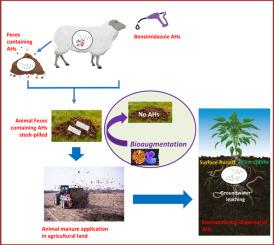Journal of Hazardous Materials ( IF 12.2 ) Pub Date : 2021-06-21 , DOI: 10.1016/j.jhazmat.2021.126439 S Lagos 1 , C Perruchon 1 , A Tsikriki 1 , E Gourombinos 1 , S Vasileiadis 1 , S Sotiraki 2 , D G Karpouzas 1

|
Anthelmintics are used to control infestations of ruminants by gastrointestinal nematodes. The limited metabolism of anthelmintics in animals result in their excretion in feces. These could be piled up in the floor of livestock farms, constituting a point source of environmental contamination, or used as manures in agricultural soils where they persist or move to water bodies. Hence the removal of anthelmintics from feces could mitigate environmental contamination. We hypothesized that a thiabendazole-degrading bacterial consortium would also degrade other benzimidazole anthelmintics like albendazole, fenbendazole, ricobendazole, mebendazole and flubendazole. In liquid culture tests the consortium was more effective in degrading compounds with smaller benzimidazole substituents (thiabendazole, albendazole, ricobendazole), rather than benzimidazoles with bulky substituents (fenbendazole, flubendazole, mebendazole). We then explored the bioaugmentation capacity of the consortium in sheep feces fortified with 5 and 50 mg kg−1 of thiabendazole, albendazole and fenbendazole. Bioaugmentation enhanced the degradation of all compounds and its efficiency was accelerated upon fumigation of feces, in the absence of the indigenous fecal microbial community. The latter contributes to anthelmintics degradation as suggested by the significantly lower DT50 values in fumigated vs non-fumigated, non-bioaugmented feces. Overall, bioaugmentation could be an efficient means to reduce environmental exposure to recalcitrant anthelmintic benzimidazoles.
中文翻译:

动物粪便的生物强化作为减轻驱虫苯并咪唑环境污染的一种手段
驱虫药用于控制胃肠道线虫对反刍动物的侵染。动物体内驱虫药的有限代谢导致它们在粪便中排泄。这些可能堆积在畜牧场的地板上,构成环境污染的一个点源,或者用作农业土壤中的肥料,在那里它们会持续存在或移动到水体中。因此,从粪便中去除驱虫剂可以减轻环境污染。我们假设噻苯达唑降解菌群也会降解其他苯并咪唑驱虫药,如阿苯达唑、芬苯达唑、利苯达唑、甲苯咪唑和氟苯达唑。在液体培养试验中,该联合体在降解具有较小苯并咪唑取代基(噻苯达唑、阿苯达唑、利苯达唑)的化合物方面更有效,而不是具有庞大取代基的苯并咪唑(芬苯达唑、氟苯达唑、甲苯咪唑)。然后,我们探索了聚生体在添加 5 和 50 mg kg 的羊粪便中的生物强化能力-1噻苯达唑、阿苯达唑和芬苯达唑。在没有本土粪便微生物群落的情况下,生物强化增强了所有化合物的降解,并且在熏蒸粪便时加速了其效率。后者有助于驱虫剂降解,正如熏蒸与非熏蒸、非生物增强粪便中显着较低的 DT 50值所表明的那样。总体而言,生物强化可能是减少环境对顽固的驱虫药苯并咪唑的暴露的有效手段。











































 京公网安备 11010802027423号
京公网安备 11010802027423号